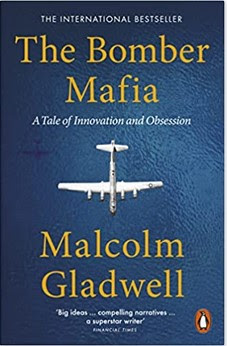The Bomber Mafia
Malcolm Gladwell definitely has his fans. You can find them in the Amazon reviews of his books, which they praise to the skies… before heaping scorn, derision and disappointment on this one. The reviews (or the ones I read, at least) seem to take it as almost a personal insult that The Bomber Mafia is so short. 206 pages – excluding notes, index and references.
I can't agree. This slender study of two different factions in the US Air Force during World War II strikes me as just the right length. It sketches in all the major players and their backgrounds, the problems faced in fighting Japan, the massive distances US bombers had to fly to attack it, and the disruptive meteorological conditions they discovered when they got there (the jet stream).
And it lays out clearly and articulately – as clearly and articulately as all of his work – the philosophical problem at the core of the book. If you accept that wars will always be fought, is it not then best to fight them as quickly as you can, and with the minimum amount of destruction as possible? This was the thinking of the ‘mafia’ of the title – the name given to a group of USAF pilots who wanted to use the pinpoint precision of the new Norden bombsight to drop their bombs only on the target.
Admirable, you might think. But what happens when bad weather disrupts weeks of careful planning? What happens when the Norden is rendered useless by cloud cover, or by the winds in the jet stream? What do you do when your desire to inflict as little damage as possible proves totally impractical?
You give command to Curtis LeMay, by all accounts a fearless pilot quite prepared to lead his bombers at low altitudes into clouds of flak and drop his bombs where they'd do the most damage. It was LeMay who took command of the March 1945 attack on Tokyo and ordered his squadrons to bombard the city with napalm. And then to do it again. And again. To Kobe, Osaka, Kure, Okayama and countless other Japanese cities. It was always LeMay’s opinion that the dropping of two atomic bombs in August was superfluous. He believed it was his bombers raining fire on everything beneath them in 1945 that destroyed Japan’s desire to fight.
Who knows? Maybe he was right. It’s one of the strengths of this book that such moral and practical considerations are laid out so clearly and that you, the reader, are given the chance to make up your own mind. Gladwell lets you know what he thinks at the end, but he also leaves it up to you to think what you think.
An excellent book.



Comments
Post a Comment